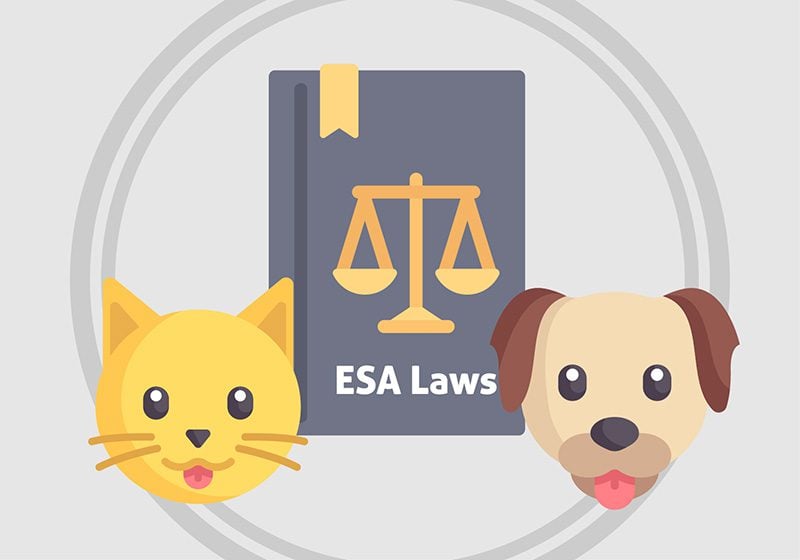Vermont’s law is very similar to the ADA’s law on emotional support animals. They are not included under the definition of service animals, which only includes dogs that are trained to complete certain tasks or services for people with physical and mental disabilities. This means that if you have been diagnosed with anxiety or depression and have a dog that has been trained to complete tasks for you, then they are not emotional support animals but rather service animals.
This is important to know. Emotional support animals are not permitted into all public accommodations like service animals are. Emotional support animals are seen more like pets since they have not been through any training and are considered unpredictable in public settings. It is always illegal to pass off your emotional support animal as a service animal.
Knowing the difference between an emotional support animal and a service animal is very important. It allows you to properly understand your individual animal’s rights and where they are allowed to accompany you. If you are someone who needs your emotional support animals to come everywhere with you, it might be worth looking into getting them training so they can enjoy the same protections as service animals.
Restrictions on Emotional Support Animals
Since emotional support animals don’t fall under the definition of a service animal, they are not allowed in all public accommodations. This means that most grocery stores, restaurants, and other public places will not permit entry to your animals, and it is still within their legal right.
This doesn’t mean that these businesses can’t modify this rule if they wish. They are allowed to permit emotional support animals if they see fit, so it might be a good idea to ask or call in advance. It might also help to have your registration on hand as well. Even though they aren’t allowed to ask for proof for service dogs, this doesn’t apply to emotional support animals.
This also means that your place of work doesn’t have to allow you to bring your emotional support animal with you to work. If this is something you think that you might actually need, you might want to consider sending your dog through proper training so that you can enjoy this protection allotted to them.
Emotional Support Animals vs. Service Animals
ESAs and support animals are classified differently under the ADA. To learn about how service animals differ from ESAs, read on.
Psychiatric Service Dog in Vermont
Service dogs can help people with physical and mental disabilities. The psychiatric service dog (PSD) is a type of service dog that can help people who have mental disabilities. These dogs help people live more independent lives and can treat a handful of conditions.
Many psychiatric service dogs are trained to perform a specific task for their owner. Some common things that these dogs can do are listed below.
- Open/close doors
- Get people to safety
- Grab someone food or water
- Find the authorities
- Prevent a panic attack from happening
- Help someone through a panic attack
- Fetch medications
Consult with your healthcare provider and trainer if you need more training options.
Psychiatric service dogs (PSDs) in Vermont are protected by federal and state law. Federal laws like the Air Carrier Access Act (ACAA) protect service dogs on public transport, the Fair Housing Act (FHA) protects them in homes, and the Americans with Disabilities Act (ADA) protects service dogs in public spaces. Also, there is no discrimination based on breed and there are no specific registrations or paperwork requirements.
PTSD Service Dog in Vermont
PTSD service dogs are fantastic companions for people who are struggling with post-traumatic stress disorder. A PTSD service dog can help in a few ways. Primarily, they’re trained to perform one specific task that usually includes opening/closing doors or providing deep pressure therapy. However, many PTSD service dogs take this a step further and can provide other types of support like helping someone through a panic attack, recognizing triggers, and fetching medications.
PTSD service dogs are trained to complete many tasks, so you can connect with trainers to help them learn about your specific conditions. After all, personalized training is essential and what separates a PTSD service dog from an emotional support animal.
Laws for Emotional Support Animals
Even though emotional support animals are not considered service animals, they are considered assistance animals. Under the Fair Housing Act, all assistance animals must be permitted housing no matter the qualifications already set in place. This means that they can not be denied entry based on breed, size, animal type, or even if the place already says no pets allowed.
These things do not apply to assistance animals. Assistance animals are most animals that provide any need for anyone with a mental or physical disability. This means they do not have to have already undergone training. Emotional support animals are considered assistance animals and do fall under this protection.
This is something that is important to be aware of. Individuals can also not be charged any fee or deposit related to their disability or assistance animal during their stay either. This does not apply to any fees for damages that the animals caused the property while there. It is important that your animal respect their environment and not destroy the location that you stay at.
You may have heard that emotional support animals are also allowed to be with you on airplanes, but this is no longer the case. The Air Carrier Access Act has been modified so that it now only protects service dogs. The only way your ESA could travel in the cabin is if it is small enough to be stowed under your seat in a carrier. Of course, taking your pet as a carry-on will not be free.
If you have an emotional support dog, you may want to consider getting it trained to be a psychiatric service animal (PSA). PSAs are service dogs that help calm distress due to mental health issues like anxiety or depression. They may perform such tasks as weight therapy by laying on their owner or grounding by pawing or licking their owner. PSAs are protected by the Air Carrier Access Act, but the airline does have the right to make you fill out a form about your dog before a flight.
Providing Proof
Emotional support animals are not service animals and therefore, do not fall under the same law that states businesses are not allowed to ask for proof of your service animal. Individuals with emotional support animals may be required to show proof a lot more often than if they had a service animal. This is to make sure that all parties involved are protected.
Landlords are required to ask for proof of registration for all emotional support and service animals. This allows them not to require any deposit or fees when you are renting a place. By not charging a fee or deposit, they allow for people with disabilities or who need the support of an emotional companion to enjoy the same benefits as others.
Why Emotional Support Animals are Important
Emotional support animals provide an important service to people with emotional disabilities, even if they are not trained. They allow these individuals to experience companionship and comfort from any hardships that they might encounter in their lives. They provide a service just as important as service animals.
It is important to make sure these animals are protected and are able to go places with their individuals so that they can experience as normal a routine as possible. Some people need extra support throughout the day, and having their emotional support animals with them goes a long way.
Why You Should Register Your Emotional Support Animals With USSA
USSA makes it easy to register your emotional support animals in a manner of minutes. It is also a reputable registration that is accepted whenever needed. Just fill out a short survey or questions and get your registration. It really is just that simple. USSA also takes pride in asking any of your questions their customer support, just in case you need a little extra help.
USSA also makes it easy to get a doctor’s note. Doctor’s notes are necessary for housing rentals and can be difficult to get if you don’t know where to start. USSA is a great resource for all your emotional support or service animal needs.

